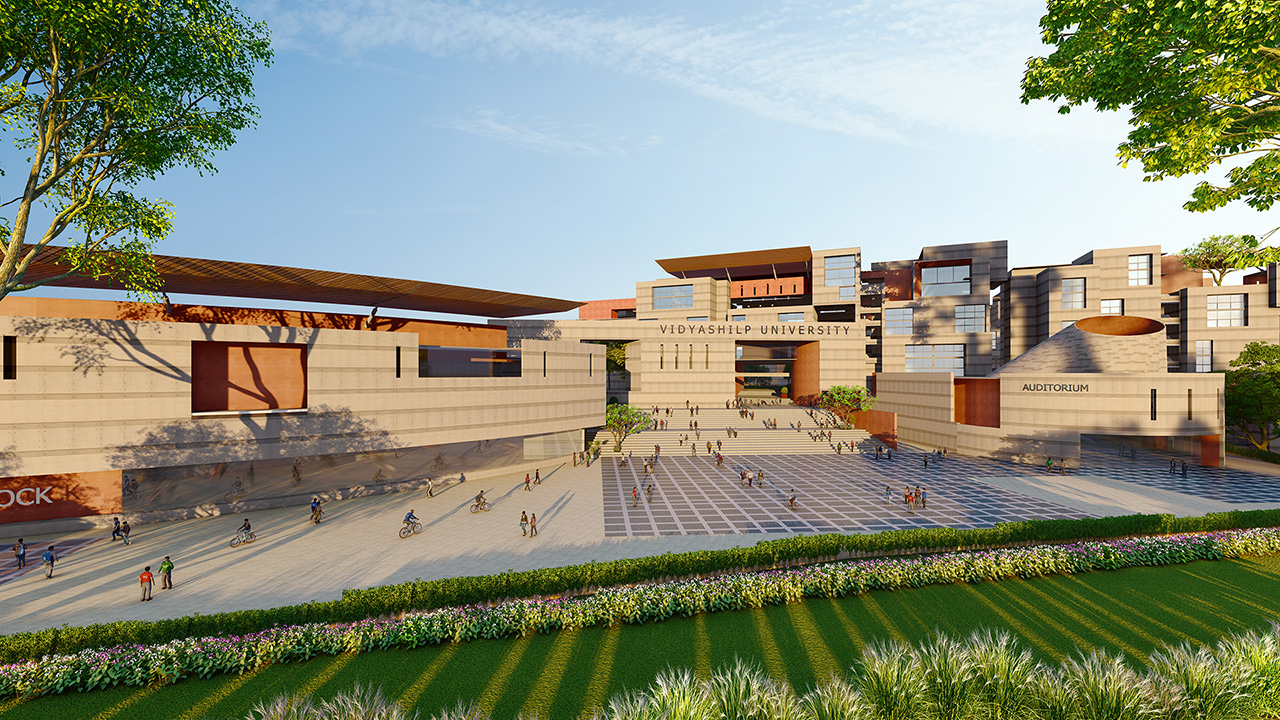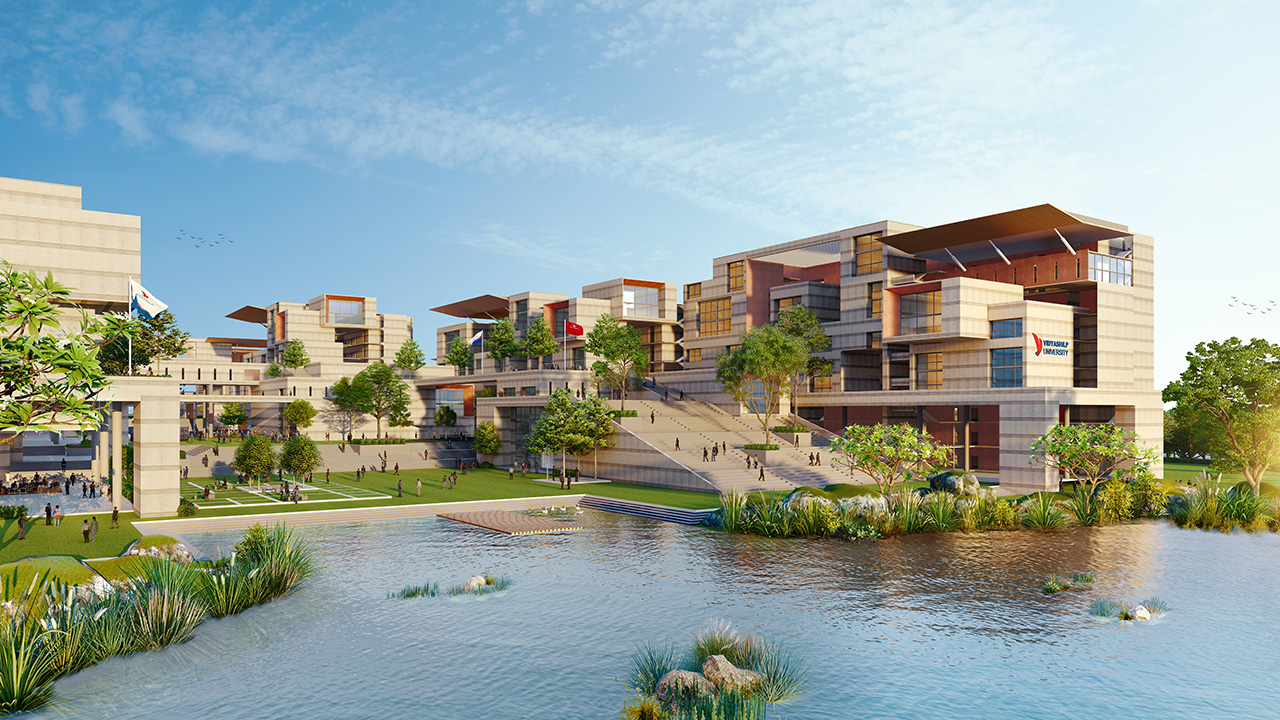Bachelor Of Arts (Hons)
Our Bachelor of Arts (Hons.) or B.A. (Hons.) is an undergraduate program offered by the School of Liberal Arts and Design Studies. Our programs are thoughtfully crafted to merge the principles of Liberal Arts with foundational theories in the respective domains, delivering a distinctive educational experience that promotes both specialized knowledge and comprehensive personal growth. The honors program fosters lifelong learning, critical thinking, and problem-solving while shaping responsible global citizens. The educational journey is designed to ensure that the synergy of our University Core, Programme Foundation, and Major discipline courses creates a comprehensive learning experience that is greater than the sum of its individual components.
Opting to pursue your studies at Vidyashilp University provides you with a contemporary and thorough curriculum designed to tackle the intricacies of not just today’s evolving landscape, but that of the future.
Major: Economics / Psychology
Minor: Data Science
Marketing
Psychology / Economics
Finance
Design
Law
4Years

B.A (Hons)
DOMAIN EXPERTISE
Integrated Education
Liberal Arts formed the foundation of education in ancient Greece, where grammar, rhetoric, and logic were its core elements. The concept has evolved over time into a diverse and specialized field. For decades, Liberal Arts education has been a cornerstone of the U.S. higher education system, widely recognised for its impact on society by leading academics. “Liberal Arts education is a vital foundation for both individual flourishing and the well-being of our society.” Christopher Eisgruber, President, Princeton University. It is only in recent years that Liberal Arts education has become popular in Asia, bringing with it the promise of broader perspectives and deeper learning. Regardless of where a Liberal Arts education originated, we, at Vidyashilp University, believe in the expansive intellectual grounding it provides and in the scope for humanistic inquiry it encourages.
A Liberal Arts education focuses not only on subject knowledge, but looks at the overall development of the graduate by fostering creative and independent thinking through a holistic educational system.
The concept of a liberal education is closely linked with Vidyashilp University’s graduate attributes. An interdisciplinary educational and professional culture is the need of the hour in India. Vidyashilp University addresses this gap through unique pedagogical practices that help break the chains of structured knowledge and enable the graduate to explore wider vistas of knowledge creation.
Why VU for B.A?
The University Core curriculum equips students with humanistic learning, social and cultural awareness, and critical thinking—essential for navigating a rapidly evolving world. Through interdisciplinary courses and diverse pedagogical approaches, the University Core fosters empathy, adaptability, and responsible citizenship, preparing students for meaningful personal growth, responsible professional success and impactful societal engagement.
Quantitative and digital skills are essential for analyzing data, making informed decisions, and solving complex problems in today's data-driven world. A liberal education involves understanding ideas in context, and this includes the ability to interpret numerical and digital information critically. The curriculum equips students with the ability to assess data, recognize patterns, and apply computational thinking to real-world challenges, ensuring they can navigate an increasingly digital landscape with confidence.
Our faculty bring international experience, groundbreaking research, and innovative
pedagogy into the classroom. As thought leaders and experts in their domains, they bridge
academic theory with real-world application, ensuring students gain relevant, future-ready
knowledge.
Meet our esteemed faculty and discover the expertise that will shape your learning
experience:
Economics:
Prof. Radhika Lobo
Dr. Sheetal Bharat
Dr. Bipin Sony
Dr. Jyotsna Rosario
Dr. Tania Sah
Psychology:
Dr. Gargi Kumar
Dr. Setu Havanur
Dr. Sheetal Lakhani
Dr. Sohinee Ganguly
VU Core:
Dr. Neha Khurana
Dr. Tania Islam
Ms. Spatica Ramanujam
Dr. Ranjana Raghunathan
Dr. Jobeth Warjri
The choice-based credit system gives the students the liberty to choose from a variety of specialization tracks and minor domains offered by the University.
Internships provide students with hands-on industry exposure, practical skills, and professional networks essential for future careers. Through strategic partnerships, students gain valuable experience in real-world settings, applying their academic knowledge to solve complex challenges. These opportunities ensure they graduate with the confidence and expertise needed to excel in dynamic professional environments.
Program Structure
4 YEARS
8 SEMESTERS
171 CREDITS
University Core
- Communication Skills
- Human Values and Ethics
- Learning to Learn
- Environmental Studies and Sustainability
- Fundamentals of Indian Constitution and Human Rights
- Community Engagement
- Socio-Cultural Perspectives on Indian Life
- Humanistic Leadership Development
- Analytical Academic Writing
- Critical Thinking
- Problem Solving for Design Thinking
Program Foundation
- Principles of Economics
- Essentials of Business Management
- Python Programming
- Introduction to Ethnography
- Foundations of Gender Studies
- Visualizing Data for Storytelling
Major Courses
- Foundations of Psychology I & II
- Social Psychology
- Biological Psychology
- Cognitive Psychology
- Psychopathology
- Advanced Developmental Psychology
- Theories of Personality
- Positive Psychology
- Organizational Behaviour
- Health Psychology
- Educational Psychology
- Research Methodology
- Experimental Psychology
- Research Design and Advanced Methods
Specialization Tracks
- Clinical Psychology
- Counselling Psychology
- Cognitive Psychology
Minors
- Finance
- Data Science
- Marketing
- Economics
- Law
- Design
Internship
- Summer Internship
- Capstone Project / Industry Immersion
4 YEARS
8 SEMESTERS
171 CREDITS
University Core
- Analytical Academic Writing
- Critical Thinking
- Problem Solving
- Design Thinking
- Communication Skills
- Humanistic Leadership Development
- Human Values and Ethics
- Learning to Learn
- Environmental Studies and Sustainability
- Fundamentals of Indian Constitution and Human Rights
- Community Engagement
- Socio-Cultural Perspectives on Indian Life
Program Foundation
- Introduction to Psychology
- Python Programming
- Visualizing Data for Storytelling
- Essentials of Business Management
- Introduction to Ethnography
- Foundations of Gender Studies
Economics Majors
- Microeconomics I & II
- Macroeconomics I & II
- Mathematics I & II
- Probability & Statistics
- Econometrics I & II
- Indian Economy
- Public Economics
- Financial Economics
- Game Theory
- Developmental Economics
- Digital Economics
- International Economics
- Research Methods
- History of Economic Thought
Specialization Tracks
- Advanced Macroeconomics
- Business Economics
- Applied Microeconomics
- Behavioural Economics
- Developmental Economics
- Quantitative Techniques
- Open Specialization
Minors
- Finance
- Data Science
- Marketing
- Psychology
- Law
- Design
Internship
- Summer Internship
- Capstone Project / Industry Immersion
Internships
As part of the graduate program the students will be exposed to internships which will help develop skill based learning of the field of choice. Students will be in a position to assist and observe heads of various organizations and gain hands-on experience of the field in the process. Such exposure will bring about the transference of learning, development of work skills as well as the development of self that would increase individualism and employability hence leading to lasting success. Students through Internships could find entry into MNC’s like Amazon, Google, IBM, EY, McKinsey or NGO’s like Teach for India, UNICEF , World Vision or other renowned organizations like WHO, WWF etc. Internships could also range in type depending on the interests of the student. Those interested in sports and fitness could enter National bodies like Sports Authority of India, CULT, IPL etc. Those interested in Psychology and gaming could look at internships in the gaming industry.
Sample Careers
- Economics Graduates can pursue careers as economists, bankers, data scientists, policy advisors, and researchers in public and private sectors, government, international relations, and academia. Opportunities extend to roles such as financial, investment, risk, and market analysts, as well as consultants in public policy, business, health, and education.
- Psychology Careers span across clinical psychology, cognitive research, organizational behavior, and mental health policy. Graduates can work as forensic psychologists, sports psychologists, neuropsychologists, or educational psychologists, contributing to healthcare, corporate sectors, law enforcement, and research institutions.
Eligibility
CBSE / ISC / STATE BOARDS / NIOS / OR OTHER NATIONAL EXAMINATIONS
Candidate must have passed 10+2 from a recognized Board with a minimum of 50% marks in any discipline.
IB
IB Diploma or IB Certificate with 3 subjects at HL and 3 subjects at SL with overall minimum of 24 points.
A LEVELS
Minimum 3 subjects in the 'A' Levels and 5 Passes in the IGCSE / GCSE including English. Minimum requirement is an average of 'D' grade.
OTHERS
10+2 qualification from a foreign university/Board, subject to submission of transcript of marks and equivalence certificate from the Association of Indian Universities (AIU).
Admission
Applicants ranking in the merit list will be invited for a Personal Interview.








